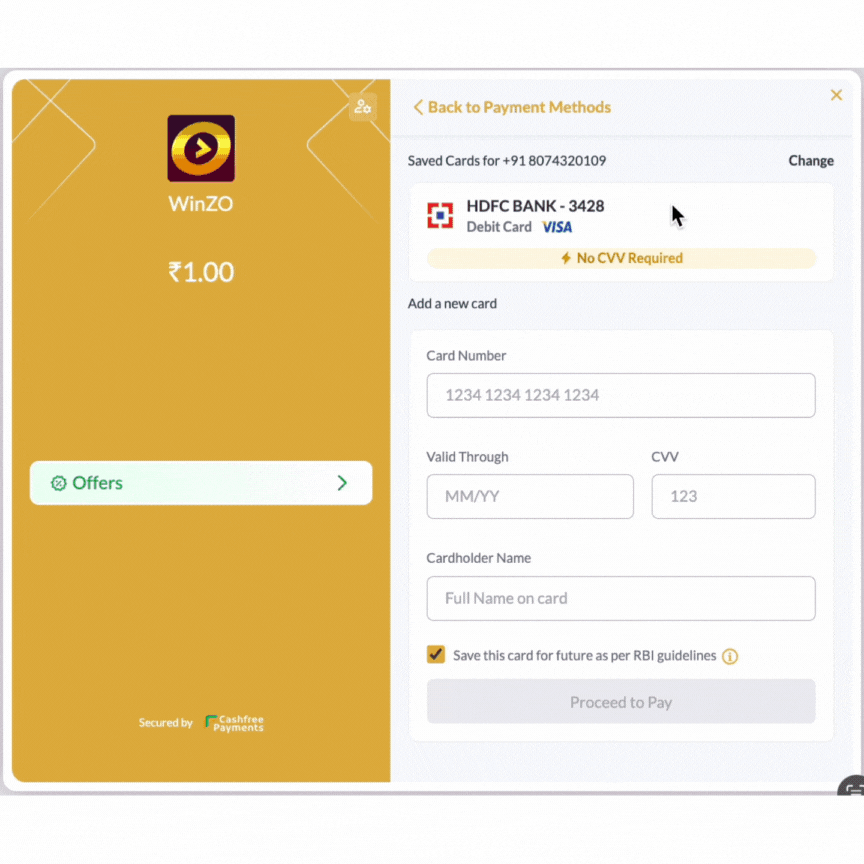
Benefits and security considerations
- Broader network support: Available across Visa, Mastercard, Amex, RuPay, and Diners networks.
- Higher conversion and success rates: CVV-less payments for tokenised cards typically improve success rates by 5% or more.
- Enabled from day 0: Enabled by default across all networks for tokenised cards from day 0.
-
CVV-less indicator: Saved cards display a No CVV Required label during checkout on the Cashfree Checkout.

- Faster checkout and reduced friction: Customers do not need to remember or enter CVV details for saved cards.
- Secure and compliant: Transactions are protected by tokenisation, OTP validation, 3D Secure authentication, and real-time risk checks. Fully compliant with PCI DSS, RBI regulations, and card network guidelines.
Using CVV-less payments with Cashfree Payment Gateway
CVV-less payments integrate seamlessly with Cashfree’s infrastructure. Depending on your integration method, minimal changes may be required.For merchants on seamless API integration
For saved card transactions across supported networks, the[card_cvv] field is optional by default. To enable CVV-less payments, exclude this field from your payment request.
Sample API request (Order Pay)
- For tokenised cards on Visa, Mastercard, Amex, RuPay, and Diners, remove the
[card_cvv]field from the card object.
Note: CVV input is optional only for tokenised card transactions, that is, transactions attempted through a saved card. For guest users making payments, CVV input remains mandatory.
For merchants using Cashfree Checkout UI
CVV-less payments are enabled by default for all saved card transactions across supported networks. No additional configuration is required.Frequently asked questions
What is a CVV-less card payment?
What is a CVV-less card payment?
A CVV-less card payment allows customers to complete a card transaction without entering the Card Verification Value (CVV)—a 3- or 4-digit security code typically required at checkout.
How is the transaction secured without CVV?
How is the transaction secured without CVV?
Security for CVV-less transactions is ensured through 3D Secure (3DS), OTP (One-Time Password) authentication, secure encryption of card data, and other additional risk checks such as real-time fraud detection.
Are CVV-less payments compliant with regulatory guidelines (like RBI or PCI DSS)?
Are CVV-less payments compliant with regulatory guidelines (like RBI or PCI DSS)?
Yes. CVV-less payments are compliant as long as they involve tokenised cards and adhere to the card network and RBI guidelines for authentication.
Why should a merchant allow CVV-less payments?
Why should a merchant allow CVV-less payments?
CVV-less payments reduce friction at checkout, improving conversion rates and enhancing customer experience, especially for a returning user base in mobile-first markets.
What are the pre-requisites for CVV-less payments?
What are the pre-requisites for CVV-less payments?
CVV-less card payment experience can only be provided for tokenised cards, that is, when the card is securely saved with a merchant.
Will offering CVV-less payments increase my payment success rates?
Will offering CVV-less payments increase my payment success rates?
Yes. CVV-less card payment feature improves conversion rates as well as success rates, typically around 2–4 percent on average.
Which card networks allow CVV-less payments?
Which card networks allow CVV-less payments?
CVV-less flow is supported for tokenised payments on Visa, Mastercard, RuPay, Amex, and Diners.
Is CVV-less payment possible via Payment Links and Payment Forms?
Is CVV-less payment possible via Payment Links and Payment Forms?
Yes. CVV-less payments are supported on both Payment Links (PL) and Payment Forms (PF).
Is CVV-less by default enabled?
Is CVV-less by default enabled?
Yes. CVV-less payments are supported from day 0 itself. Merchants can provide a CVV-less experience for their customers (but only on tokenised cards).

